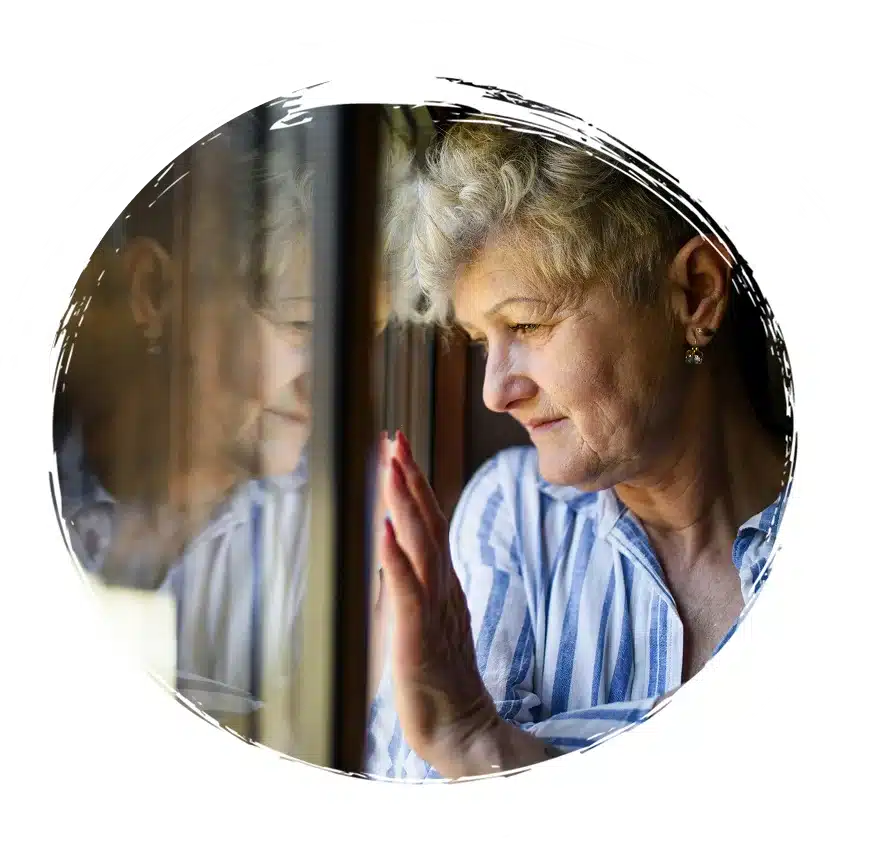Navigate Loss. Find Strength.
Start a New Chapter.


Letting go of hurt is difficult, but it is possible.
Grief looks different for everyone. While loss is a universal experience, the way we process it depends on many factors, including the nature of the loss, our personal coping mechanisms, and the support we receive.
At Beyond Counseling, our team of compassionate grief counselors in Turnersville, Sewell, and South Jersey can help you navigate grief, find ways to express it, and eventually move on.
Go From This
To This
Take the first step and let us help you.
Do you experience any of these?
Grief affects you both physically and emotionally. A grief counselor works with you to identify and express the suppressed emotions in a safe space. Reach out and book a consult today.

Life without grief feels bright, balanced, and full of peace. Here is how grief counseling transforms your life:

Develop healthy coping mechanisms to manage grief and adapt to life after loss.
Grief shows up in so many different ways. That’s why we use a wide variety of therapy modalities to help you cope with and recover from grief. Our team of compassionate grief counselors in Turnersville, NJ, specializes in:
Existentialism is a way of thinking that focuses on each person’s unique experiences and choices. Grief brings deep sadness, confusion, and a sense of emptiness. Existentialism helps by reminding us that, even in pain, we have the power to find meaning. It encourages us to:
This is one-on-one time with a trained therapist. When someone special to us passes away, the sadness can feel overwhelming. And we feel scared and helpless. One-on-one sessions help you communicate these feelings and ease the heavy weight of grief.
How Individual Therapy Helps with Grief:
These are calming activities like deep breathing and guided imagery. They help quiet the mind and relax the body. People use them to ease stress, find peace, and manage strong emotions during grief.
How Meditation and Relaxation Help with Grief:
Open dialogue means speaking honestly about feelings. When someone we love passes away, it can feel like a heavy cloud is hanging over us. Talking about our feelings helps relieve some of that burden.
How Open Dialogue and Sharing Help with Grief:
Cognitive Behavioral Therapy (CBT) offers a way to help manage intense feelings of loss caused by the death of a loved one, breakup, or even losing a job. CBT is a type of talk therapy that focuses on changing unhelpful thoughts and behaviors to improve how we feel.
How CBT Helps with Grief:
Bereavement therapy supports people after losing a loved one. It helps them talk about their grief, understand their feelings, and learn ways to cope. It provides comfort and guidance through the healing process.
How Bereavement Therapy Helps with Grief:

You don’t have to carry this alone.
Loss changes everything, bringing waves of emotions that can feel unpredictable and overwhelming. There’s no right way to grieve, and no timeline for healing. Whether you’ve lost a loved one, a relationship, or a sense of the life you once knew, you deserve compassion and support. Grief counseling offers support, understanding, and guidance to help you navigate loss and find a way forward.

Denial: "This is not real …… is it?"
Symptoms of Denial:
Denial is the first thing you experience after you lose a loved one. It is your mind’s way of protecting you from overwhelming pain. It’s waking up and expecting everything to be normal. Until the weight of loss hits again.
You know the truth, but part of you isn’t ready to accept it yet. Denial is taking grief in small, manageable pieces. It gives your heart time to catch up with reality. And that’s okay.
Anger: "Why did this happen to me?"
Symptoms of Anger:
Anger is like fire. Burning hot. Unpredictable. And sometimes uncontrollable. It can be directed at doctors, family, or even the person you lost.
You may feel abandoned or that life is deeply unfair.
I feel angry. I want to scream, punch a pillow, or just be left alone. Why did this happen? Why them? Why me?
Some days, even small things set you off. You snap at people who are just trying to help. You feel guilty for being angry but don’t know what to do. It’s exhausting to carry all this pain.
Anger is part of healing. It shows that what you lost mattered. But it is not permanent – you get through it.
Bargaining: "If only I had done more…"
Symptoms of Bargaining:
Stuck in the endless loop of “what ifs” and “if onlys.”? Bargaining is like replaying the same scenes over and over, searching for a different ending.
You did the best you could with what you knew at the time. No amount of “what if” can change the past. But kindness to yourselfcan shape how you heal.
Depression: "I can’t do this anymore."
Symptoms of Depression:
Depression is like sinking into deep water, too tired to swim back to the surface. You may feel exhausted, disconnected, or like nothing matters anymore. Some days, just getting out of bed feels impossible.
I don’t have the energy to care. I don’t want to see anyone. I don’t even recognize myself anymore. Does this pain ever stop?
People say time heals, but you don’t feel any different. It’s like your life is going on, but you are somehow not a part of it.
This pain of losing a loved one is real, but you are not alone. Reach out, even if it’s just a tiny step. Grief doesn’t mean you have to carry everything by yourself.
Acceptance: "I’m learning to live with this loss."
Symptoms of Acceptance:
Accepting what happened does not mean that you forgot and “moved on.” when you accept reality, you find a way to heal and live on with your loved one’s memories. It’s realizing that grief and joy can exist together.
Grief changes you. But accepting reality helps you go on living peacefully.
Grief is not just about losing a loved one. It happens whenever we lose something important. It can come in many forms – ending a relationship, losing a friend, losing a job, etc.
Losing Someone You Love
Losing Your Health
When sickness takes away your strength, grief follows. Chronic pain, a serious diagnosis, or a sudden health problem can change everything. Simple things become harder, and future plans may have to change.
You used to dance in the kitchen while making coffee. Now, even standing too long leaves you breathless. You watch others move easily, unaware of the simple joys you once took for granted. You wonder if they realize how lucky they are.
People may not understand what you’re going through, especially if your illness isn’t visible. Losing your health can also lead to anxiety and depression, making it even harder to cope.
Losing a Job
Work is more than a paycheck. Losing a job can feel like losing a piece of yourself. It’s not just about the financial stress, though that alone is heavy. It’s about feeling like you no longer have a place, like the skills and talents that once made you valuable are now useless.
He wakes up at 6 AM, like always, then remembers there’s nowhere to be. His morning coffee tastes bitter. The silence of the house feels suffocating. He checks his email again, but there’s nothing. Just a message from the bank reminding him that the bills won’t stop, even when life does.
Even retirement, something meant to be joyful, can bring feelings of loss. Without the work structure, people can feel adrift, wondering, Who am I now?
Losing Who You Are
Losing Your Safety
Losing a home, belongings, or sense of security is painful. Natural disasters, war, and crime can take away everything instantly.
She has locked the door three times now. Double-checks the windows. The house is the same, but it doesn’t feel the same. Ever since the break-in, every shadow looks like a threat. Every creak sounds like danger.
A stolen identity or broken trust can make the world feel unsafe. Losing security can bring fear, stress, and a constant feeling of being on edge.
Losing Freedom and Independence
Not all loss is physical. People who are imprisoned, kidnapped, or stuck in abusive relationships lose more than just their surroundings. Those who face racism, sexism, or discrimination may feel robbed of opportunities.
He watches from the window as people walk freely down the street, laughing, moving, living. He remembers when that was him. Before the accident. Before the wheelchair. Before the world started treating him like someone less.
Losing independence is a grief many don’t recognize, but it’s real. It’s the pain of being unable to move through the world the way you once did and the struggle of finding new ways to reclaim power over your own life.
There is no right or wrong way to grieve. Everyone experiences grief in their own way. Some people cry, some get angry, and some try to stay busy and distracted. Others may feel numb or disconnected from the world.
Grief affects theheart, mind, body, actions, and beliefs. It brings many emotions, thoughts, and even physical changes. Every reaction is normal.
Emotional Reactions
Grief is like being on a rollercoaster with no warning signs. One moment, you’re numb. The next, a wave of sadness crashes over you. Anger, anxiety, guilt – each emotion fights for space, sometimes all at once. Some people even feel relief, and then guilt for feeling it.
“I should be crying more,” she whispers to herself, staring at the untouched pile of tissues. She hasn’t cried in days, but the ache in her chest is still there. Is she grieving the wrong way?
There is no “right” way to grieve. Emotions change from moment to moment, and that’s okay.
Mental Reactions
Grief can make time feel strange. Days blur together, and simple things like remembering where you put your keys feel impossible. Sometimes, it even tricks your mind.
He swears he heard his mom call his name. He turns around, heart racing. But the room is empty. His hands shake as he exhales. “Just my mind playing tricks on me,” he mutters. But deep down, he wishes it wasn’t.
Forgetfulness, confusion, and even seeing or hearing the person who’s gone are all normal. The brain struggles to make sense of loss and sometimes tries to fill in the gaps.
Physical Reactions
Grief doesn’t just live in the heart – it settles into the body. It can feel like exhaustion so deep even sleep doesn’t fix it. It can bring headaches, stomach pain, and tightness in the chest. Some people can’t eat, while others can’t stop.
She stares at the untouched plate of food. She knows she should eat, but the thought of chewing and swallowing feels like too much. Across the room, her best friend watches, worry in her eyes. “Just one bite?” she asks gently.
Grief drains energy, weakens the immune system, and can make the body feel heavy and immovable. The pain isn’t just emotional – it’s physical, too.
Changes in Behavior
Grief can shift a person’s entire way of living. Some people withdraw from the world, canceling plans and avoiding calls. Others throw themselves into work or distractions to escape the pain. Some turn to unhealthy habits, seeking comfort in food, alcohol, or risky choices.
“You never come out anymore,” her friend says, concern in his voice. “I just don’t feel like myself,” she replies, staring at the TV that’s been playing all day, though she hasn’t really been watching.
Big losses change routines, relationships, and self-perception. It’s okay to take time, but it’s also okay to ask for help when grief starts to take control.
Spiritual Reactions
Loss can shake a person’s faith to its core. Some people find comfort in religion or spiritual practices, while others feel abandoned by what they once believed.
“I used to pray every night,” he says softly. “Now, I don’t even know if I believe in anything anymore.” His friend nods, understanding. “It’s okay,” she says. “Maybe faith isn’t about having all the answers. Maybe it’s just about asking the questions.“
Grief can lead to doubt, but it can also lead to new understandings. Whatever the reaction, it’s part of the journey.
Grief doesn’t follow a schedule. Some people think you should “move on” after a certain time, but that’s not how grief works. Telling someone to “get over it” isn’t fair and can make them feel even worse.
The truth is that grief is personal. It doesn’t disappear after a few weeks, months, or even years. Some days will feel okay, while others will bring back deep sadness, anger, or anxiety. And that’s normal.
Even with therapy or support, grief takes time. Healing doesn’t mean forgetting – it means learning to live with the loss. However long it takes, your grief is valid, and you are not alone.
Grief cannot keep you stuck - you are stronger than it.
Understanding the different types of grief can help you make sense of your emotions and find the support you need.
Prolonged Grief/Complicated Grief
Headaches, anger, irritability, muscle tension - grief affects you both physically and emotionally.
Another morning. Another day that feels exactly the same. At work, it’s hard to focus. Deadlines slip. Emails go unread. At home, you don’t know what everyone is talking about.
It’s not that you don’t care – it’s that your mind is somewhere else, stuck in memories and the loss. Grief has stolen your energy, your motivation, your sense of self. You don’t recognize the person staring back at you in the mirror.
Therapy won’t ask you to “let go” or forget. But it can help you find a way to live without being buried by the loss. Reach out today.
Delayed Grief
Delayed grief is real, and it’s never too late to grieve your loved one properly.
Do you feel any of these?
Delayed grief shows up in unexpected ways. At work, a colleague’s comment makes you snap. Every small thing irritates you at home, and you don’t understand why. Therapy helps you understand your emotions and process grief in a safe space. Reach out today
Traumatic Grief
Flashbacks, intrusive memories, and nightmares bring the loss back as if it’s happening all over again.
A constant loop of What if I had done something differently?plays in the background. Whether it was an accident, an illness, or something sudden, the mind keeps searching for ways it could have been prevented.
You keep replaying the moment you found out. The details won’t leave you alone – the phone call, the sirens, the last time you saw them. It hits you randomly, and suddenly, you’re right back in that moment, like it’s happening all over again.
Losing a loved one suddenly in an accident, disaster, or illness is hard. Therapy helps you process these painful emotions and get on with your life. Contact today for a consult.
Anticipatory Grief
The unknown makes it impossible to fully prepare, no matter how much time there is.
Does any of this cross your mind?
Therapy helps you grieve in a way that allows you to keep going, even when the hardest day eventually comes. Reach out now.
Cumulative Grief
Just as one loss starts to settle, another one comes, leaving no time to process or heal.
“I can’t even process what I’ve already lost because part of me is just waiting for the next call, the next tragedy, the next heartbreak.”
Just as one loss starts to settle, another one comes, leaving no time to process or heal. You look at old pictures, hear a song from years ago, and feel sad – not just for the people you’ve lost but for yourself. The version of you that existed before all the grief, the one who wasn’t carrying so much.
Therapy gives you space to process each loss – one at a time – without feeling like you have to keep pushing forward just to survive. Reach out today.
Collective Grief
It feels as if no amount of donating, protesting, or spreading awareness is enough to make a real difference.
“It’s not just my grief,” you think, “it’sour grief.” And that realization, while validating, can also be overwhelming. The feeling that the whole nation, the whole community, is grieving settles in your bones, a heavy, unspoken burden.
Collective grief shows up in your life in many ways;
Therapy helps you develop healthy coping mechanisms to manage the stress. Reach out today.
Masked Grief
Grief does not go away on its own - it's okay to let your guard down and acknowledge your pain.
Do any of these sound familiar?
Taking care of other grieving family members. Taking care of the responsibilities. All this leaves no time for you to grieve. Headaches, digestive issues, rashes, high blood pressure, and sleep disturbance are some common side effects of masked grief.
Therapy helps you grieve in a way that helps you unload all those suppressed emotions. Reach out today.
Inhibited Grief
You feel emotionally numb, and work seems complicated because you feel exhausted suppressing your emotions.
Sometimes, when someone you love is gone, you don’t feel sad like you think you should. Maybe you feel numb. Maybe your body hurts. It’s like your feelings are stuck. You try to push them away. You might feel angry or tired all the time. It’s hard to do everyday things.
Grief is like a big wave. It can scare you. You might try to hide from it. You think if you don’t feel it, it will go away. But it doesn’t. It stays inside. It can make you feel bad in many ways. It’s okay to feel lots of things. Talking about it can help.Reach out for a consult.
Absent Grief
Sometimes, it can take a while for the feelings of grief to surface.
You know they’re gone, but it feels…distant. Like it happened to someone else. You might be doing all the right things, but inside, there’s a quiet space. You wonder if something’s wrong with you if you’re not grieving “right.”
Sometimes, grief hides under a blanket of “doing okay.” It’s okay if you don’t cry. Your heart might be scared. It’s like it’s hiding to stay safe. Maybe you’re in shock. Maybe you’re trying to be strong. You might do lots of things to keep busy. It’s okay.
Therapy helps you find those hidden feelings, even if they’re just tiny whispers. You don’t have to feel it all at once. Reach out today.

Reach out, ask us anything, or schedule a consult today.

No, healing does not mean forgetting them. Counseling helps you honor their memory while healing and processing the emotions.
Getting Started is Easy
We Accept the Following Insurance





Reach Out Now
If you’re ready for hands-on help, please book a consult or request an appointment today!
Our Promise to You
Our Values
How We Work
Mental Health Resources
Our services
Ask us anything or request an appointment